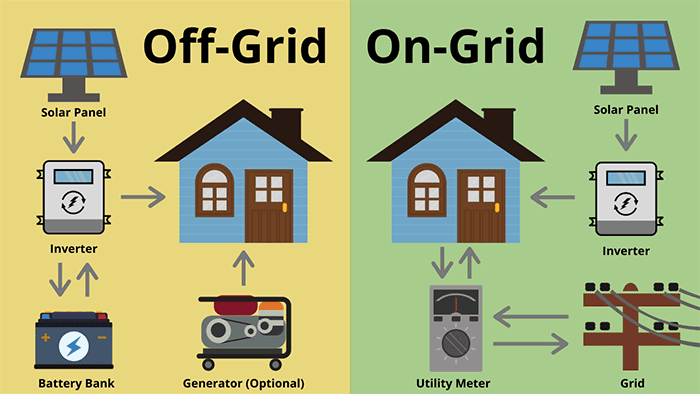
If you’ve been considering the option of investing in renewable solar energy and have been doing your research pre-purchase, you’ve probably come across some of these terms: On-grid, off-grid, grid-direct, grid-tied.
The following outline will clarify any questions you may have about the differences between on-grid and off-grid solar systems. And if you still have any doubts after reading it, don’t hesitate to get in touch with the team at Solbase.
On-grid Solar Systems
Also referred to as Grid-Direct, Utility-Interactive, Grid-Intertied, and Grid-back Feeding, as the name itself indicates these type of solar systems are tied to the grid.
But what is the grid?
As Wikipedia would have known, the electrical grid is:
“An interconnected network for delivering electricity from suppliers to consumers.”
In your case, your grid is your local energy supplier’s system.
The more popular of the two alternatives, on-grid home solar power systems offer a guarantee of continued supply in cases of unexpected disruption.
On-grid systems also allow you to build credit from your energy supplier if you produce more energy than your solar panels use to cover your household’s needs. Should this be your case, the excess energy produced will be redirected to the grid. And as a reward for contributing towards the supplier’s energy generation, you will be given a certain amount of credit on your bill.
So, in a nutshell, what are the benefits of on-grid solar systems?
- The grid acts as a battery, that is, in case of a discontinued supply of energy, you can rely on the external grid. As a result, there’s no need for you to purchase a costly battery back-up system for you to store any excess energy generated by your home solar power system.
- Your on-grid domestic solar panels can contribute to the grid’s energy generation when the amount of electricity consumed in your home is less than what its solar panels produce.
- On the other hand, when a home or business’s solar panels are not producing sufficient energy for the efficient running of all the appliances and electronic equipment, the electricity from the grid will supplement or replace the electricity from the panels. This is generally the case at night or during stormy days.
- This oversupply and lack of energy in home solar power gets recorded in what is known as a metering agreement which, takes place between consumers and energy companies. This agreement allows utility customers to receive credit for the excess energy they generate, typically credited as a kilowatt-hour credit on the next month’s bill.
- A grid-connection will allow you to save more money with solar panels through better efficiency rates, net metering, plus lower equipment and installation costs:
- Overall, on-grid solar systems are usually simpler to install, as they don’t require a back-up battery, and they tend to require a lesser initial capital investment.
Off-Grid Solar Systems
Referred to as a Grid-tied Solar Power System or as a Battery Back-up System, off-grid solar panels do not rely in any way on an energy supplier’s electrical grid.
In which way is this form of renewable solar energy appealing?
Many customers prefer to be completely self-reliant when it comes to solar energy generation and enjoy covering 100% of their home or business’ energy needs with their own off-grid solar panels.
While there’s a tendency for urban home solar power systems to rely on the grid, remote customers often have no choice but to generate their own energy off the grid.
These systems typically require:
- A battery bank to store solar electricity for use during night time or periods of cloudy weather. The battery will store whatever amount of energy that doesn’t need to be used by your building.
Given the fact that you will become completely reliant on your own resources, you need to install a battery bank sufficiently large to see you through at least 3 days without any solar charging.
- A backup source of energy, for instance, a generator.
- A monitoring device to keep the output of the panels below the maximum allowable taking into account what’s stored in the batteries and to balance energy consumption with production.
So, in a nutshell, what are the benefits of Off-grid solar systems?
- An off-grid solar power system eliminates your electricity bill for good.
- It’s ideal for remote situations where power is expensive to bring in.
- There will be no unexpected power outages.
- Complete self-sufficiency on a clean, renewable energy
There are obvious disadvantages for the off-grid user, the most significant being the need to purchase bulky, costly and rather environmentally unfriendly back-up battery. Once all additional equipment is added, a residential off-grid solar system typically costs an average of $15,000 more than an on-grid system.
However, it does still make sense for the environmentally-minded consumer in remote locations to invest in off-grid systems. If a property owner in an isolated rural location needs to have power brought in it, the costs may very well exceed the batteries and generator required for an off-grid system.
The choice between off-grid and on-grid solar systems is yours but Solbase is always ready to provide expert advice.
